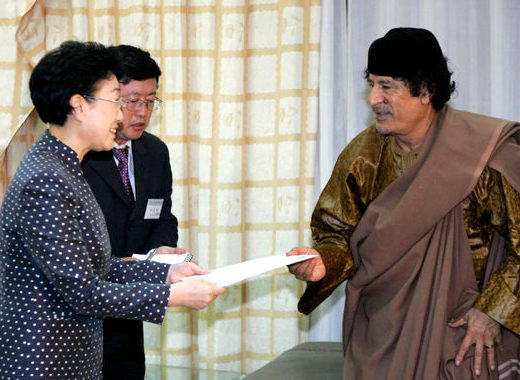Posted on : Sep.22,2006 14:22 KST
Modified on : Sep.23,2006 11:50 KST
 |
|
Prime Minister Han Myung-sook meets with Libya’s leader Muammar Al Qaddafi on September 20. Tripoli/Yonhap News
|
A 27-year-old military officer led a coup in a North African country nearly 40 decades ago. In December 2003, Libya’s leader Muammar Al Qaddafi announced that his country had given up its weapons of mass destruction, and with that, the Great Socialist People’s Libyan Arab Jamahiriya opened its doors to the West once again. For a long time, Libya had been placed under economic sanctions and been branded as a ‘rogue country’ by the U.S., but it is now attracting global interest for its ‘Libyan Solution.’ What exactly is the Libya of today?
The skies above Tripoli, the capital of Libya, were as blue as the Mediterranean on the morning of September 20, when Prime Minister Han Myung-sook paid a surprise visit, the first since diplomatic relations were reestablished between the two countries. However, the pleasant first impression does not last long. The international airport had no civilian aircraft, only old fighters and huge military transporter planes. On the side of an airport building hung a lonely, colorful poster of ’Captain Qaddafi.’ It seemed like a military town, painted in khaki hues. Any sign of Libya’s entry into the Western world could not be found. An expert on North Korean issues that was part of the prime minister’s entourage mumbled, "This is just like the Soonan Airport in Pyongyang."
The media were escorted by four security officers, who followed close behind and kept a watchful eye on their subjects day and night outside the press center.
After secret negotiations with the U.S. and U.K., Libya announced the abandonment of its weapons of mass destruction on Dec. 19, 2003 and opened its doors again to the Western world. However, an atmosphere of monitoring and control is still pervasive. To get inside the al-Kabir hotel, where the media stayed, one had to pass through a security checkpoint, one person at a time. At around 6 p.m. when the prime minister had finished her military review and was on her way to the hotel, the streets were almost empty, despite the fact that it was rush hour. A government official knowledgeable about the region said, "For the last three years, Libya has had 8.5 percent economic growth per annum, and their per capita income has grown close to US$6,000, one of the highest in Africa. In terms of the global community, the opening [of Libya] is judged to be a great success. However, there still exists a ’big brother,’ watching from every corner of society."
It must have been the long-lasting dictatorship, but the old habit of leader idolization seemed hard to shake. Any foreigner who is to see Qaddifi had to first make a schedule to offer flowers to the grave of Qaddifi’s father. Prime Minister Han also stopped by the grave, outside Tripoli.
But three years of openness to the outside world have definitely changed the country. Here and there in the city of Tripoli, women strolled without wearing the hijab or chador and openly chatted with men. Starting from about 8 a.m., the Green Plaza in the center of Tripoli was filled with hundreds of people, mainly groups of youngsters and families, who had come out for a leisurely stroll. The initial trepidation felt at the airport fades into the colorful hubbub of the crowd.
Professor Yoo Dal-seung, an expert in the politics of the Middle East, said, "Libya’s reestablishment of diplomatic relations with the U.S. should not be interpreted as a ‘declaration of surrender.’ One of the reasons for Libya’s opening is that...the long period of economic sanctions provided a cause for young intellectuals to threaten [Qaddifi]." Libya’s opening is a result of its own strategy for survival, created through dialogue and discussion. Professor Yoo continued, "However, this society is dominated by a Koran-based Islamic ideology, direct democracy, and economic socialism - its opening will not lead to a sudden clash of cultures."






